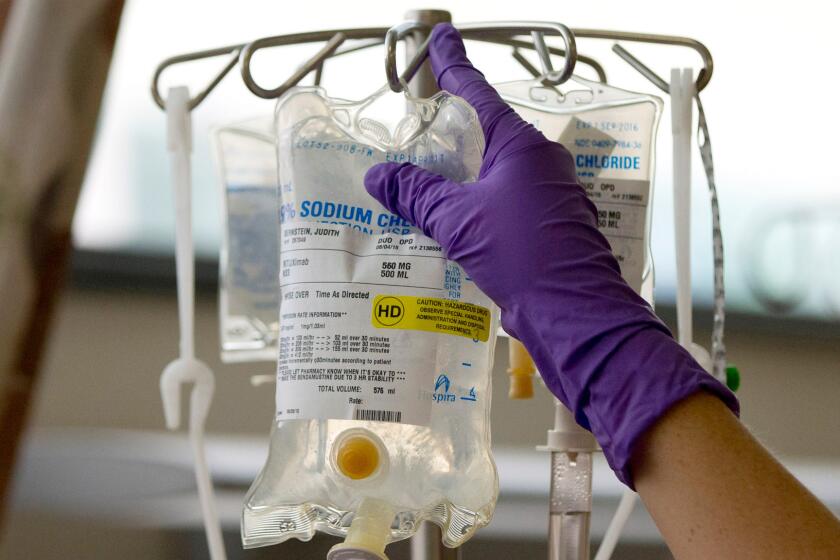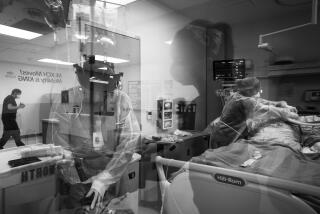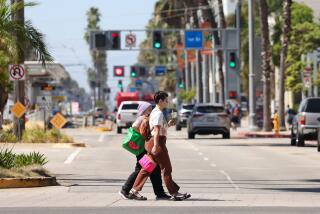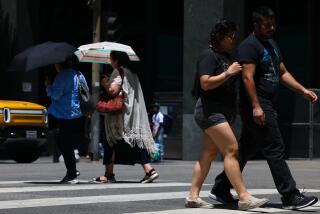The coronavirus is particularly unkind to those who are obese
- Share via
America’s obesity epidemic appears to be making the coronavirus outbreak more dangerous — and potentially more deadly — in the United States, new research suggests. For younger and middle-aged adults in particular, carrying excess weight may significantly boost the likelihood of becoming severely ill with COVID-19.
The evidence for this comes from thousands of COVID-19 patients who sought treatment in emergency departments in New York, and it’s prompting alarm among doctors and other health experts. In the U.S., 42.4% of adults have obesity, which means their body-mass index, or BMI, is 30 or more.
In one of two new studies released this week, COVID-19 patients who were younger than 60 and had a BMI between 30 and 34 were twice as likely as their non-obese peers to be admitted to the hospital for acute care instead of being sent home from the ER. They were also 1.8 times more likely to require critical care in a hospital’s intensive care unit.
Here’s an inside look with doctors and nurses on the frontlines of the COVID-19 battle.
More severe obesity posed an even greater risk to COVID-19 patients in this under-60 age group. When these patients had a BMI of 35 or higher, they were 2.2 times more likely than their non-obese peers to need standard hospital care and 3.6 times more likely to end up in the ICU.
“Obesity appears to be a previously unrecognized risk factor for hospital admission and need for critical care,” wrote the authors of the study published this month in the journal Clinical Infectious Diseases. But that only applies to relatively younger patients; among those ages 65 and older, there was no link between obesity status and hospital care.
The authors, from New York University’s Grossman School of Medicine, suggested that the country’s high prevalence of obesity might be nudging rates of severe illness and death higher in the U.S. than in South Korea, China and Italy, where obesity rates are lower.
The results also give doctors a new way to predict which COVID-19 patients who are not yet senior citizens run a higher risk of hospitalization and critical illness.
“Unfortunately, obesity in people <60 years is a newly identified epidemiologic risk factor,” wrote the researchers, who included 3,615 patients in their study.
In a second report, a different team of NYU doctors and researchers examined the factors that appeared to predispose 4,103 COVID-19 patients of all ages to hospitalization. That study was posted Saturday to the website MedRxiv, a forum for sharing work that has not yet been peer-reviewed and published in a medical journal.
Consistent with virtually all research on the coronavirus, this study found that being older than 75 was the most potent predictor of hospitalization for COVID-19, followed by being between the ages of 65 and 75.
The third-best predictor was having a BMI over 40, a condition doctors call “severe obesity.”
When all other factors were held equal, COVID-19 patients with severe obesity were more than six times more likely to be hospitalized than were patients who were not obese. Even a history of heart failure was less likely to land a COVID-19 patient in the hospital, the researchers found.
Almost 10% of U.S. adults have a BMI of 40 or more.
Inhaled nitric oxide appeared to kill the coronavirus that caused severe acute respiratory syndrome, or SARS, and it might work on COVID-19 as well.
To make matters worse, the authors of the study found that elevated levels of inflammation upon hospital admission was one of the four top signs that a patient’s condition would become critical. Because stored fat is a powerful driver of inflammation, that measure tends to be higher in people with obesity.
“We find particularly strong associations of older age, obesity, heart failure and chronic kidney disease with hospitalization risk, with much less influence of race, smoking status, chronic pulmonary disease and other forms of heart disease,” the researchers wrote.
Obesity is linked to higher rates of many disorders affecting the respiratory system, including obstructive sleep apnea and asthma. So people carrying extra weight may be more susceptible to infections that affect the lungs.
But there’s also good reason to expect that people with obesity might suffer more from a respiratory infection, said William Dietz, an obesity researcher at George Washington University . Since they typically carry more fat around their midsections, people with obesity tend to have reduced lung volume to begin with. For the same reason, they need to expend more effort with each breath, Dietz said.
That is a particular burden when an infection compromises the lungs’ ability to take in oxygen for transport to the blood. And when patients are immobile and lying flat on their backs, as is often the case in a hospital bed, excess weight in the midsection is a force that works against even the power of mechanical ventilation, he said.
For that reason, patients with obesity who are mechanically ventilated are often laid on their stomachs, a practice that has been widely observed in ICUs caring for COVID-19 patients.
“This is not reassuring for the United States,” said Dietz of the new findings.
A diagnosis of breast cancer is always accompanied by angst and uncertainty. It’s even more fraught when it comes in the midst of the coronavirus crisis.
Vulnerability to lung infections is further compounded by many of the social factors that are also linked to obesity, said Steven Gortmaker of Harvard’s Chan School of Public Health. African Americans, low-wage workers, those in poverty and people with poor access to healthcare have higher rates of both obesity and of respiratory illnesses, he said.
That these groups appear to be disproportionately affected by COVID-19 is probably not a coincidence, Gortmaker added.
Nor is the new coronavirus the first novel pathogen to afflict those with obesity, he added. A 2011 study found that half of California adults who were hospitalized with the H1N1 “swine flu” virus in 2009 and 2010 had obesity, and those with extreme obesity were more likely to die.
The finding prompted researchers to recommend that adults with obesity be given priority for vaccines and for antiviral medications that could treat the infection.









